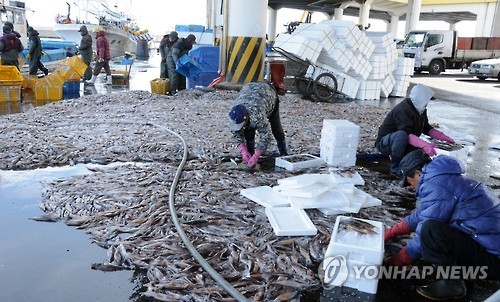South Korea's squid catch from the East Sea has been on a steady decline over the past four years due mainly to Chinese boats' overfishing, data showed Tuesday.
According to the data by the National Federation of Fisheries Cooperatives, the amount of squid sold at its 18 cooperatives along the east coast came to 67,479 tons last year, slightly down from 67,941 tons the previous year.
Squid catch from the East Sea amounted to 83,566 tons in 2012, but it slumped to 75,660 tons the following year.
In September this year, squid output declined approximately 10 percent on-year to 17,911 tons, with the full-year haul expected to fall from the previous year.
The gradual decline in squid catch was attributed to overfishing by Chinese fishing vessels in North Korean waters. In 2004, North Korea and China signed a pact allowing Chinese ships to fish in North Korean waters in return for fees.
 |
A photo taken Jan. 5, 2016, shows workers putting squids into boxes in the eastern port city of Gangneung. (Yonhap) |
Experts said Chinese trawlers catch a large amount of squids that head south from North Korean waters, resulting in a decline in South Korea's catch.
A yearly migratory species, squids are known to spawn in waters off South Korea's southernmost island of Jeju and the southeastern port city of Busan, head north in spring and return to their spawning grounds between July and September.
The number of Chinese fishing ships operating in North Korean waters surged to up to 1,900 in 2014 from 140 a decade ago. South Korea's Ministry of Oceans and Fisheries puts the number at 700 ships as of October this year.
Most are vessels over 200 tons and are allowed to operate in North Korean waters if they pay fees for fishing, sparking fears over the depletion of North Korean fish stocks.
Chinese fishing vessels are also said to damage fishing nets and other gear set by South Korean fishermen while sailing through open seas south of Jeju toward North Korea waters.
The ministry said it has been steadily calling on Beijing to ensure that Chinese fishing boats make a detour so as not to inflict damage on the South Korean fishing equipment.
There are high tensions between Seoul and Beijing after a Chinese boat illegally fishing in South Korean waters sank a 4.5-ton Coast Guard speed boat in a collision 10 days ago. The speed boat was on a mission to capture a Chinese fishing ship poaching there when another Chinese boat rear-ended it. The incident has worsened a bilateral conflict over the long-drawn issue of Chinese boats operating illegally in South Korean waters. (Yonhap)








